On the morning of December 31, Prime Minister Pham Minh Chinh attended the conference to review the work in 2023 and deploy directions and tasks for 2024 of the natural resources and environment sector, organized by the Ministry of Natural Resources and Environment .
Also attending the Conference were Deputy Prime Minister Tran Hong Ha, Minister of Natural Resources and Environment Dang Quoc Khanh, and leaders of central departments, ministries, branches and agencies.
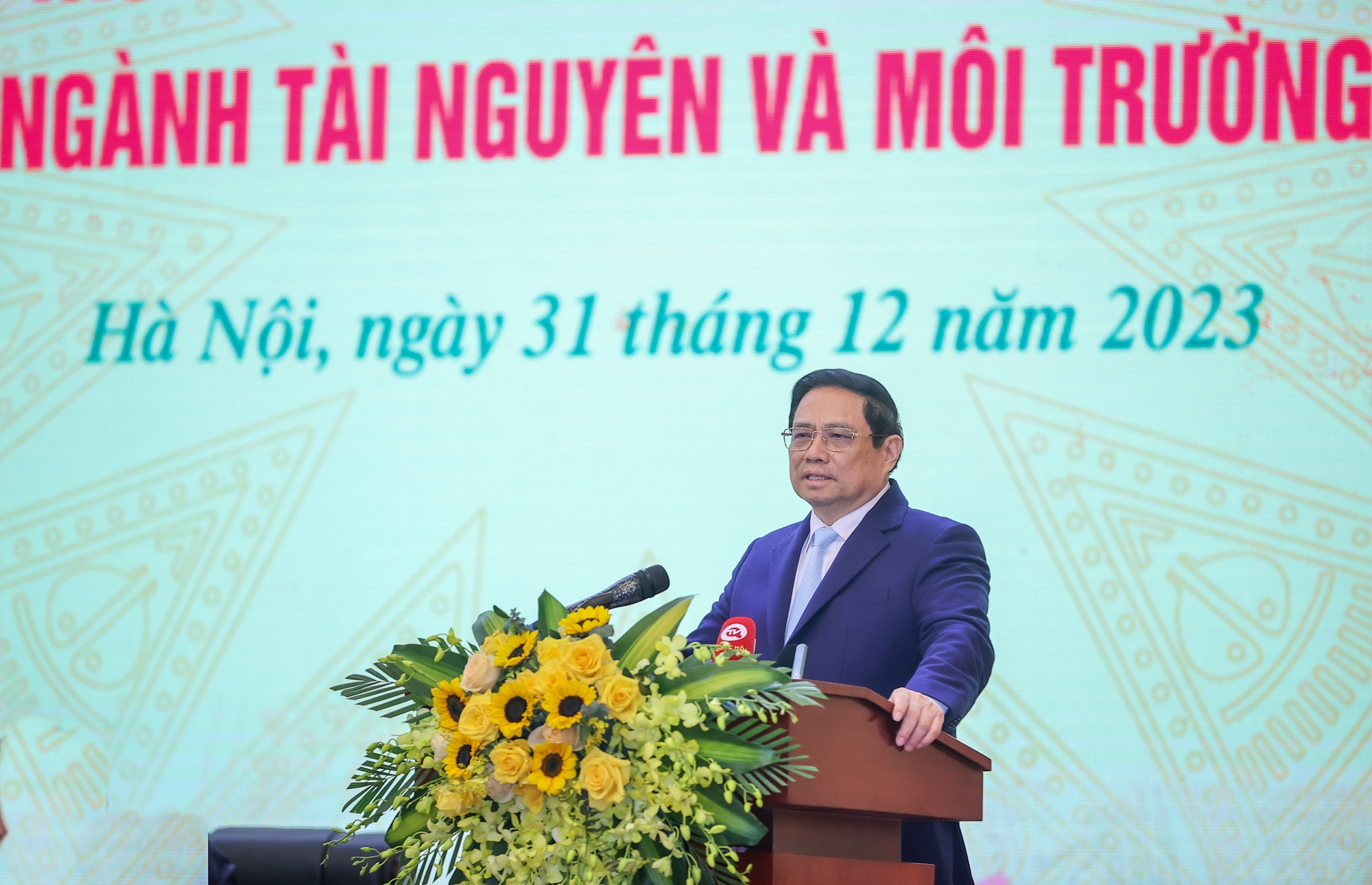
Prime Minister Pham Minh Chinh delivered a speech at the Conference.
Consulting and handling 172 projects and works that did not put land into use or were slow to put land into use.
Speaking at the Conference, Prime Minister Pham Minh Chinh acknowledged, commended and highly appreciated the efforts, results and achievements that the natural resources and environment sector has achieved, making important contributions to the country's overall achievements and results in 2023.
In particular, the work of perfecting institutions, policies and laws continues to be directed and implemented by the Ministry, thereby creating a legal system on natural resources and environment that is increasingly synchronous, unified and put into practice, such as the construction of the draft Law on Land (amended) and the Law on Water Resources (amended).
The Prime Minister highly appreciated the efforts of the sector, which plays a key role in drafting the Land Law (amended) to help resolve current difficulties and obstacles, promoting the country's rapid and sustainable development. The whole sector has well organized the collection of public opinions on this draft law with diverse methods of collecting opinions, with 12 million comments. Along with that, the Law on Water Resources (amended) has been passed by the National Assembly.
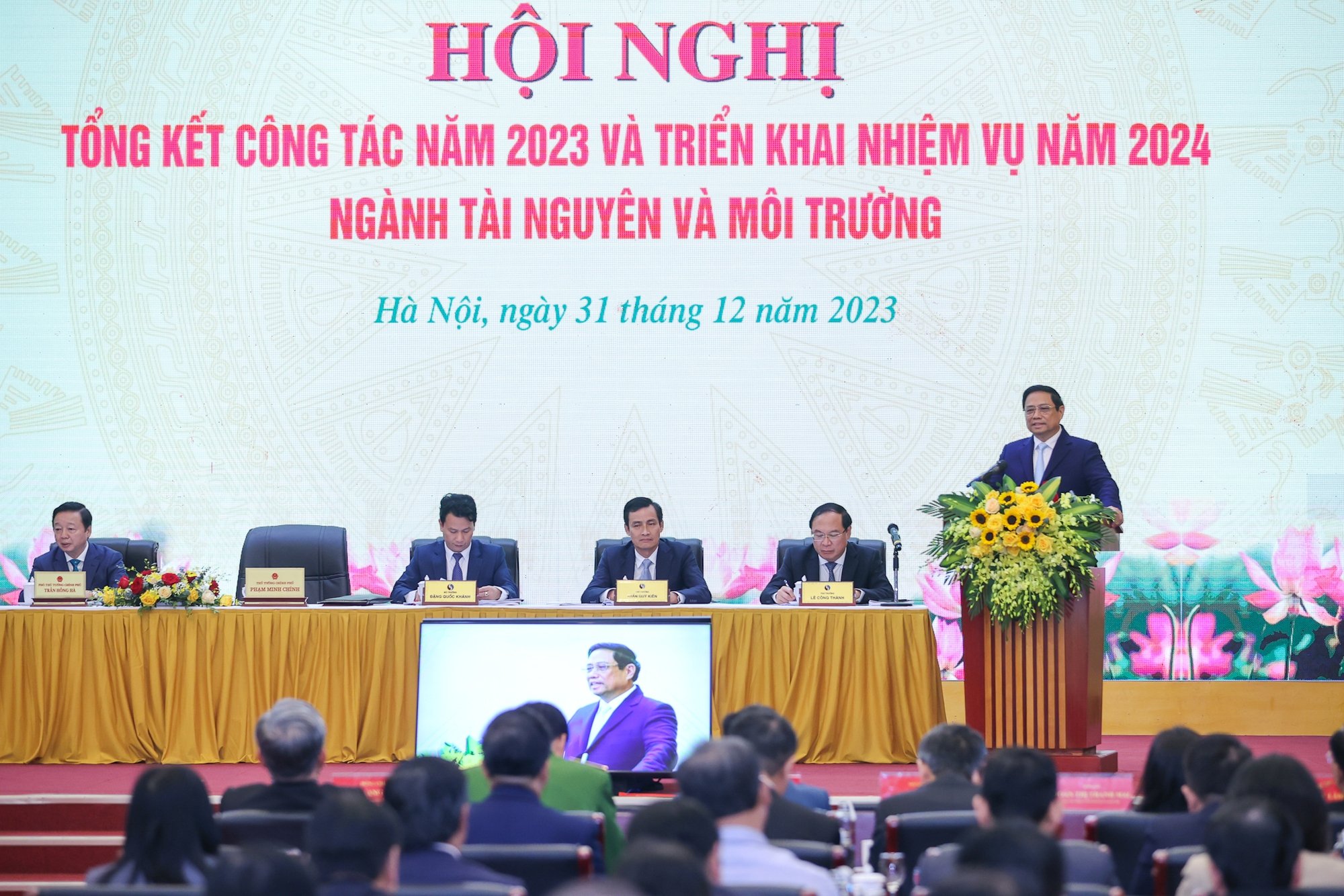
The Prime Minister noted the need to continue modernizing and increasing the hydrometeorological network, radar stations, and monitoring network, and improving forecast quality.
The Ministry has proactively and urgently developed and submitted for approval all national-level plans (8/8 plans), which are all important plans that open up, lead, and serve as a foundation for the development of industries and sectors. In particular, the development of the National Marine Spatial Plan is very important but is a difficult and complicated task, implemented for the first time in our country.
The entire sector has advised and handled 172 projects and works that have not put land into use or have been slow to put land into use, with an area of 6,922 hectares. Guided and coordinated with localities to effectively implement land recovery and site clearance for the construction of key national projects; basically met the supply of materials for the construction of key projects and works in the northern region and the Central Highlands, prioritizing the immediate arrangement of 9.1 million m3 of sand for filling to serve highway projects in the Mekong Delta region.
The industry also conducted a survey of sea sand resources, initially identifying an area of about 32 km2, with reserves of 145 million m3 with feasible exploitation conditions to propose moving to the exploration and exploitation phase.
The implementation of policies and solutions for green transformation, emission reduction, and proactive response to climate change has been very positive, achieving important results, especially in promoting energy transition. Vietnam is the first country to announce a Resource Mobilization plan, marking an important milestone towards the implementation of the Just Energy Transition Partnership (JETP) mechanism agreed between Vietnam and the International Partnership Group (IPG).
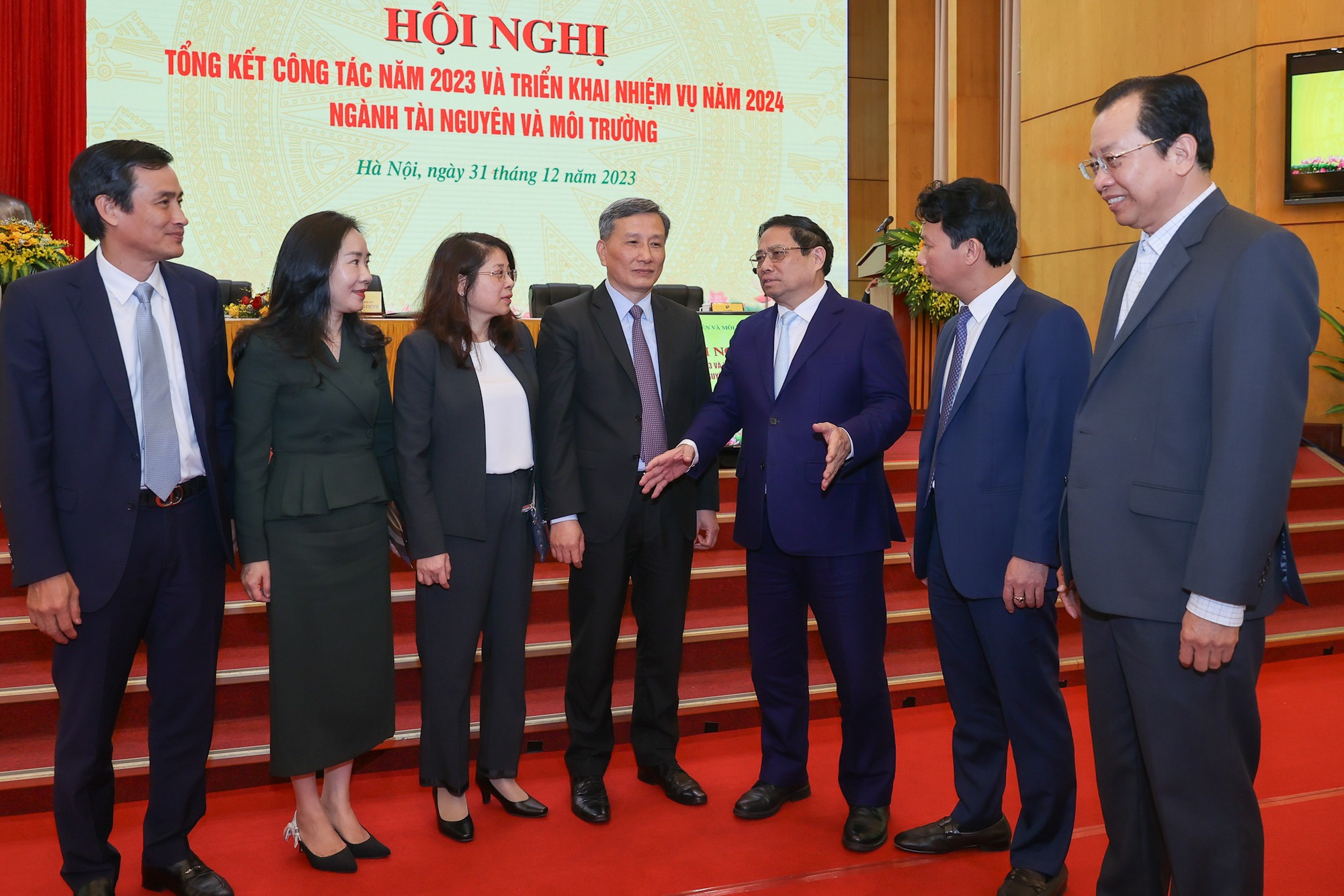
The Prime Minister talked with delegates attending the conference.
Decentralization, maximum delegation, what the locality can do, do well then let the locality do
In 2024, Prime Minister Pham Minh Chinh emphasized the need for the natural resources and environment sector to focus all resources on completing the draft Law on Land (amended) to ensure quality for submission to the National Assembly for approval at the nearest session; organize the implementation of the Law immediately after its approval, along with the Law on Water Resources (amended). At the same time, organize the development of the Law on Geology and Minerals to submit to the Government for consideration and submit to the National Assembly in 2024; continue to review and remove obstacles in sub-law documents to promote socio-economic development.
Continue to strongly reform, minimize cumbersome and unnecessary administrative procedures; at the same time, decentralize and delegate maximum authority, let localities do what they can and can do well. However, it is necessary to ensure that decentralization goes hand in hand with appropriate resource allocation, improve implementation capacity, strengthen inspection, supervision, and control of implementation, and prevent and combat corruption and waste.
The Prime Minister gave an example that the current approval procedure for converting the purpose of using rice and forest land is still very cumbersome. 10 hectares of rice and 20 hectares of forest must be submitted to the Prime Minister, through a multi-step process, taking a lot of time, wasting resources and opportunities, and hindering development. The Prime Minister said that it is necessary to decentralize the decision-making process to localities.
At the same time, focus on removing difficulties and obstacles to manage and use the country's resources more effectively. Continue to effectively organize the implementation of the Law on Environmental Protection 2020. Strengthen inspection, examination and strict handling of establishments and acts violating environmental laws.
Diversify and attract investment in developing environmental infrastructure, treating and recycling waste and wastewater with modern, environmentally friendly technology. Implement green credit and issue green bonds. Pilot research on circular, low-emission models to gradually replicate them nationwide.
Along with that, deploy an action plan to implement political commitments with partners on supporting a fair energy transition, developing ecosystem-based economic sectors and implementing adaptation models, enhancing resilience, minimizing losses and damages caused by climate change. There should be specific projects, programs, and support mechanisms for businesses to effectively use this support source...
Source


![[Photo] Closing of the 1st Congress of Party Delegates of Central Party Agencies](https://vphoto.vietnam.vn/thumb/1200x675/vietnam/resource/IMAGE/2025/9/24/b419f67738854f85bad6dbefa40f3040)


























![[Photo] Editor-in-Chief of Nhan Dan Newspaper Le Quoc Minh received the working delegation of Pasaxon Newspaper](https://vphoto.vietnam.vn/thumb/1200x675/vietnam/resource/IMAGE/2025/9/23/da79369d8d2849318c3fe8e792f4ce16)
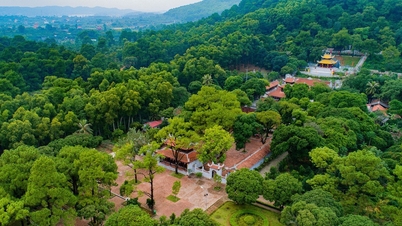

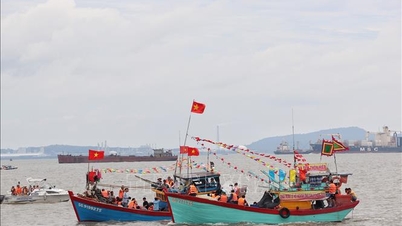



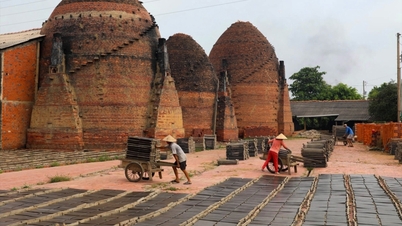


























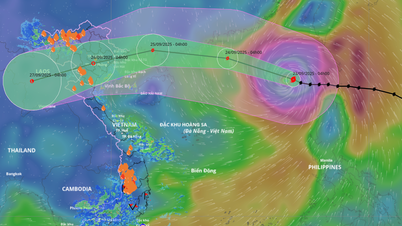
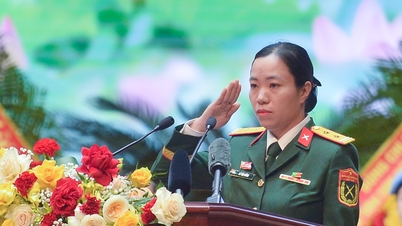
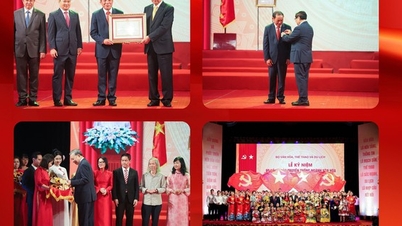




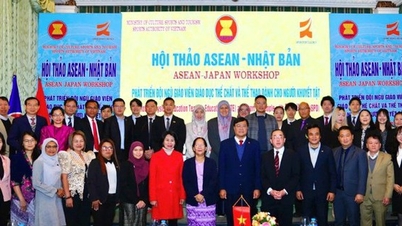



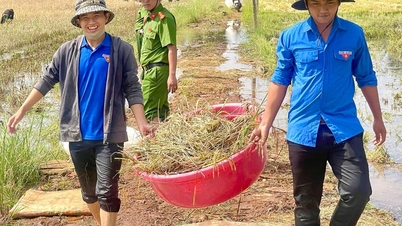

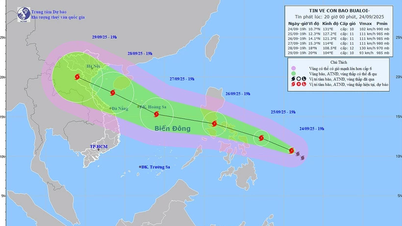

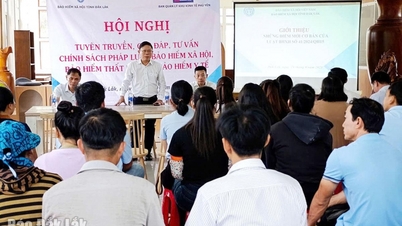


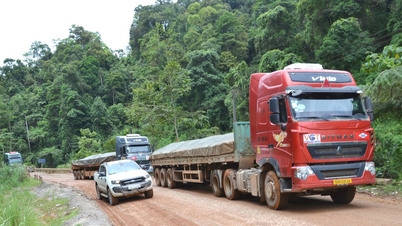


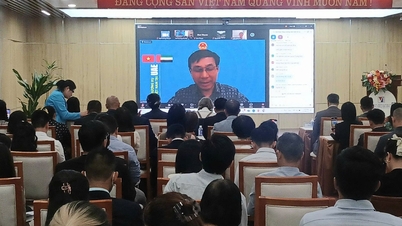



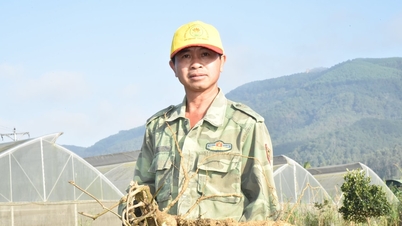








Comment (0)